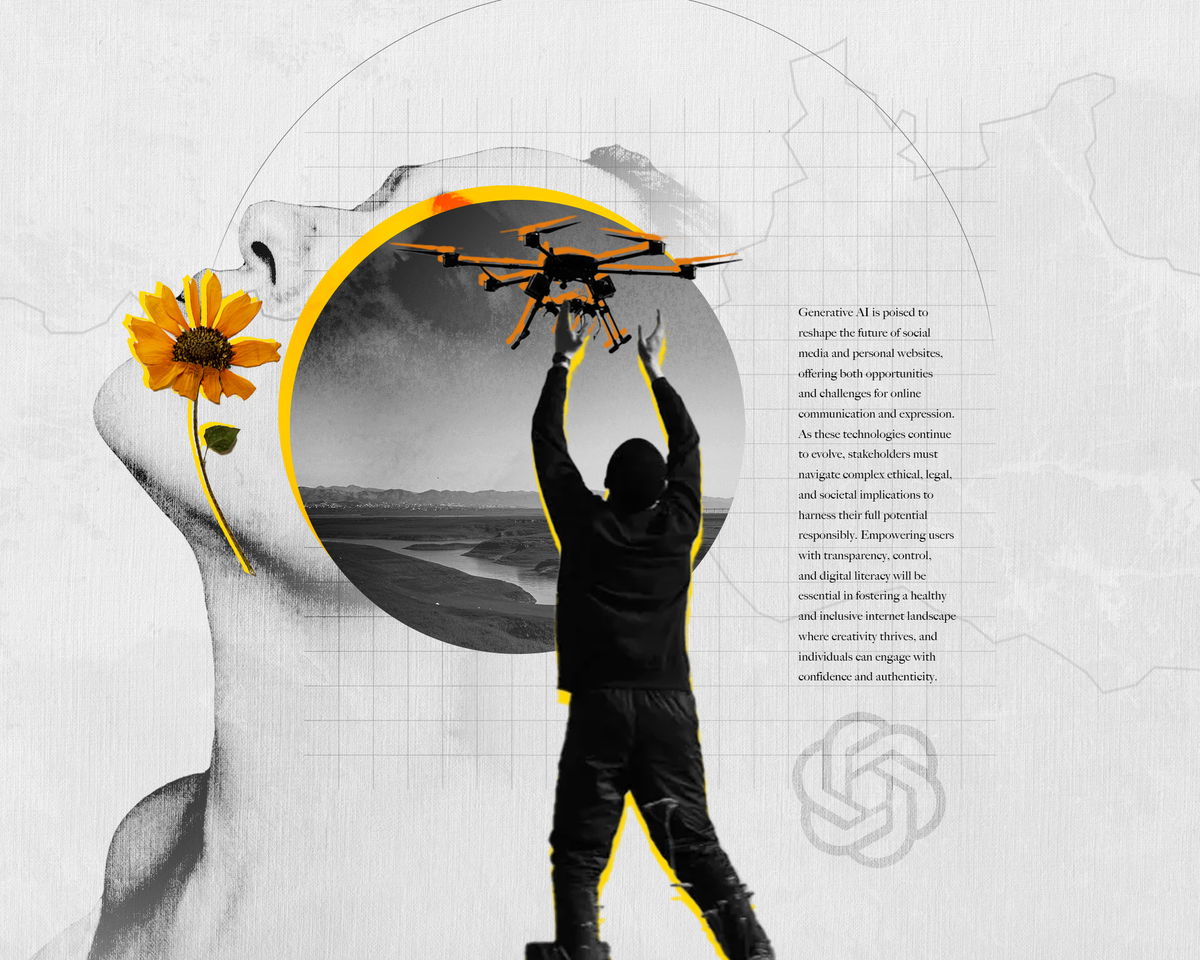Democratization and Shifting Landscapes
In 2024, amid global shifts, we face the democratization of defense, art, and more. AI's rise prompts reflection on human creativity's irreplaceability.

It’s 2024, and we hear a lot about democracy. Whether it's the crises Western nations experience, the explosion of alternative narratives chipping away trust in current establishments, the democratization of defense through the use of cheap and effective drone technologies in the Ukraine-Russian conflict, or the democratization of art with the increasing prominence of generative AIs. The last example is something we explore a lot as designers and developers since our livelihood is directly influenced by the increasing accessibility of knowledge and “copyright-free” media. “Are we getting replaced by an AI?” is a question we hear a lot more often nowadays, and there is a good reason for it as more and more jobs are automated.
I’m one of those people who was very scared, angry, and insecure when Midjourney redefined my ambitions to improve myself in the field of digital illustration. It took me some time to understand that although markets can and will shift in this area, there is nothing preventing me from continuing my passion. The only thing that changed is the incentives. It is easy for me to empathize with the angry crowds who wished to become masters of their crafts, only to find their ambitions redefined by new technologies. We can see examples from the past: horses and carts were replaced by cars and trucks, painters were partially replaced by the advent of photography, classical animation techniques lost their prominence in favor of more efficient 3D animation techniques, and we can expect some changes in manufacturing due to 3D scans and printing.
With new, more accessible technologies, we have a choice: to dig into our expertise or to move with the flow of the markets. I think this shift is in some ways different, as we see this happening globally across multiple fields and industries at the same time. Emotions surrounding it are then produced, edited, and delivered in plentiful flavors and delivered in perfect bite-size, less-than-50-second short formats right to our feeds. Although I can empathize, I don’t agree with the militant approach calling for bans on AI anymore. This is bigger than us, and we need to harness this new power. We are creative people; we think outside the box. Although we have the right to mourn what could have been, we can’t afford to stagnate because the world we would like to bring back is the world in which we are the same as the rent-seekers we so vehemently criticize. Don’t be lazy. Get on your feet and go back to the fight.
Fast Media and Confirmation Bias
In the last decade, we have experienced unprecedented polarization in the Western world. If we explore the political landscape, we find many answers ranging from the alienation caused by late-stage capitalism to the decline of traditional social norms. I don’t want to diminish or even comment on any of these, but rather explore another point of failure our society struggles to cope with. Humans have an immense propensity for confirmation bias and we very rarely use cold, hard facts to reason ourselves into positions. Instead, our views are often products of our experiences, and our reason and critical thinking are employed for their justification, very rarely for their evaluation. One thinks about all those flat-earth believers launching various science missions to prove that the earth isn’t round.
Tribes of the Internet
This inclination influences consumer choices in the landscape of alternative (and social) media, further solidified by algorithms that lock users into particular content consumption. These people then start to create a homogenized culture (language, narratives) with others sharing similar algorithmic profiles while insulating them from those outside.
The increasing speed and ease of media production may reach a tipping point where it becomes profitable to satiate the demand for any hypothetical narratives that validate our emotional states. This puts platforms that recognize the boundaries of the hyper-real nations ahead of their competitors. Are the huge public squares just prisons of internet nations yearning to be recognized and grouped with their kin? A decade ago, this would have been a silly question, but nowadays, being recognized as a user of Truth Social, TikTok, or Rumble can hold political connotations.
New Frontier: Art and Web Design in a Post-AI World
When I was contemplating the opportunities AI will take from creators, I thought about the artists I follow, the ones who impacted me the most. “Will they also be doomed to lose their jobs?” I asked myself. “No, that would be ridiculous,” I realized. These people aren’t just masters of their craft; they are thought leaders, performers who are not afraid to be vulnerable, sharing their wisdom filtered by unique human experiences. AI has no chance in this game. It’s a new frontier.
As a designer with stakes in web development, I often encounter opinions that in today’s age of social media, there is no place for personal websites, that these are just slowly fading relics of the late 2000s. I would beg to differ; I would even go so far as to say that we are entering a new era in which a strong personal brand is the best way to stay ahead of the curve. Although social media will play an important role in capturing audiences, they are insufficient in fully facilitating the expression of our identities online. Social media influencers, bloggers, freelancers, and professionals in various fields will use personal websites as a centralized hub for their online presence. And while AI will help us to become more efficient, we need to focus on our humanity.
The Future of Brands is Human
The human experience is ever-changing, influenced by innumerable factors, and inevitably reduced when described through language. AI may write an essay, but it will never share a story; it may create an image, but it won’t relate to the emotion it depicts. I see so many companies adopting AI in hopes that it will replace creativity, but most of the time, the results are soulless, synthetic, and inhuman. Then there are designers who adopt AI as a mere tool to help tell a story. I cannot stress enough how obvious this disparity is. In the upcoming years, the essence of this disparity will become apparent to many as AI-generated content floods our screens and saturates our news, social media, and music. My opinion is that people gravitate towards the authentic and imperfect, and it will be our job to tell the story in the world where just one story isn't enough to paint the whole picture.
